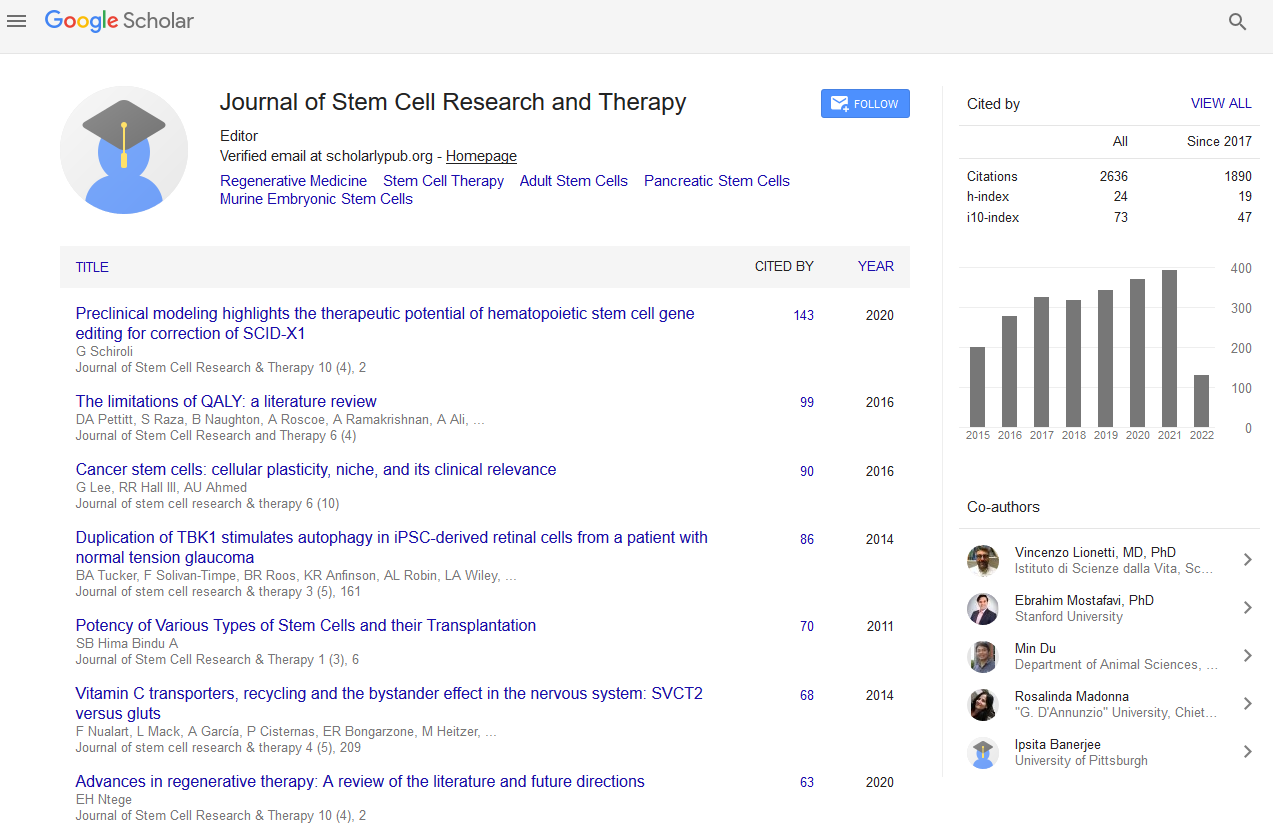Indexed In
- Open J Gate
- Genamics JournalSeek
- Academic Keys
- JournalTOCs
- China National Knowledge Infrastructure (CNKI)
- Ulrich's Periodicals Directory
- RefSeek
- Hamdard University
- EBSCO A-Z
- Directory of Abstract Indexing for Journals
- OCLC- WorldCat
- Publons
- Geneva Foundation for Medical Education and Research
- Euro Pub
- Google Scholar
Useful Links
Share This Page
Journal Flyer

Open Access Journals
- Agri and Aquaculture
- Biochemistry
- Bioinformatics & Systems Biology
- Business & Management
- Chemistry
- Clinical Sciences
- Engineering
- Food & Nutrition
- General Science
- Genetics & Molecular Biology
- Immunology & Microbiology
- Medical Sciences
- Neuroscience & Psychology
- Nursing & Health Care
- Pharmaceutical Sciences
Abstract
Muscle Derived Stem Cells Stimulate Muscle Myofiber Repair and Counteract Fat Infiltration in a Diabetic Mouse Model of Critical Limb Ischemia
Tsao J, Kovanecz I, Awadalla N, Gelfand R, Sinha-Hikim I, White RA and Gonzalez-Cadavid NF
Background: Critical Limb Ischemia (CLI) affects patients with Type 2 Diabetes (T2D) and obesity, with high risk of amputation and post-surgical mortality, and no effective medical treatment. Stem cell therapy, mainly with bone marrow mesenchymal, adipose derived, endothelial, hematopoietic, and umbilical cord stem cells, is promising in CLI mouse and rat models and is in clinical trials. Their general focus is on angiogenic repair, with no reports on the alleviation of necrosis, lipofibrosis, and myofiber regeneration in the ischemic muscle, or the use of Muscle Derived Stem Cells (MDSC) alone or in combination with pharmacological adjuvants, in the context of CLI in T2D.
Methods: Using a T2D mouse model of CLI induced by severe unilateral femoral artery ligation, we tested: a) the repair efficacy of MDSC implanted into the ischemic muscle and the effects of concurrent intraperitoneal administration of a nitric oxide generator, molsidomine; and b) whether MDSC may partially counteract their own repair effects by stimulating the expression of myostatin, the main lipofibrotic agent in the muscle and inhibitor of muscle mass.
Results: MDSC: a) reduced mortality, and b) in the ischemic muscle, increased stem cell number and myofiber central nuclei, reduced fat infiltration, myofibroblast number, and myofiber apoptosis, and increased smooth muscle and endothelial cells, as well as neurotrophic factors. The content of myosin heavy chain 2 (MHC-2) myofibers was not restored and collagen was increased, in association with myostatin overexpression. Supplementation of MDSC with molsidomine failed to stimulate the beneficial effects of MDSC, except for some reduction in myostatin overexpression. Molsidomine given alone was rather ineffective, except for inhibiting apoptosis and myostatin overexpression.
Conclusions: MDSC improved CLI muscle repair, but molsidomine did not stimulate this process. The combination of MDSC with anti-myostatin approaches should be explored to restore myofiber MHC composition.


